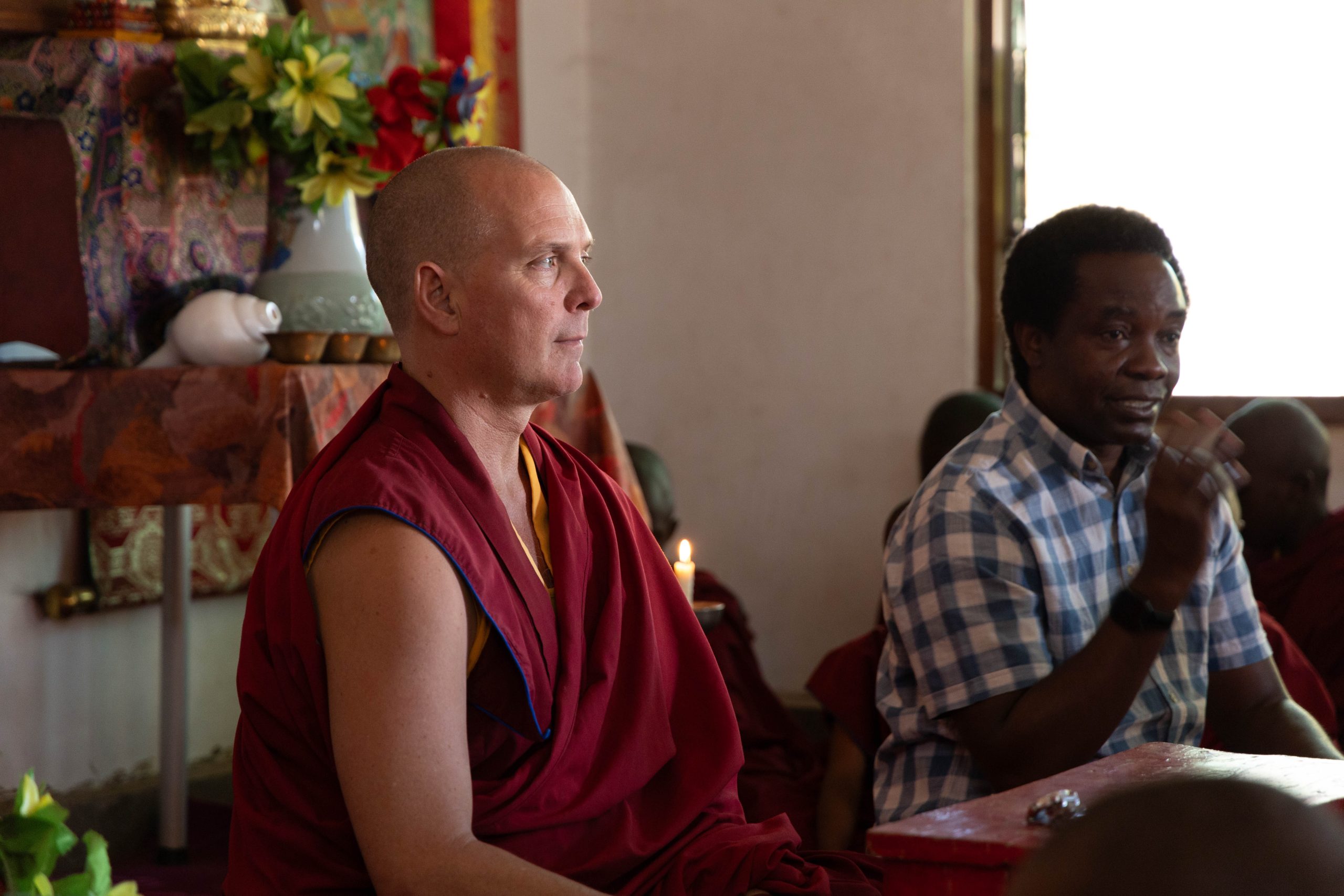Well, it’s a little over a month since Drupon Rinpoche came to Congo and set in motion a whole new chapter for Dharma in Africa with the ordination of forty young monks.
I’d arrived a couple of weeks before Rinpoche to get my bearings and a sense of things on the ground. Samten came with Lama Katen from South Africa, where they’d been filling the statues for the newly built temple there. Much of that initial time was spent being introduced around and preparing the monastery site, helping the menfolk scythe grass and erect a large wooden structure to be covered with canvas for the refuge ceremony and teachings.
We also considered various options for housing the future monks and settled on keeping them here at the main centre to begin with. A house not far away is being renovated so that we can move across.
At the moment, we are still based at the centre, which consists of a shrine room attached to Francis’s family home. It’s challenging in many ways. It is situated in a relatively poor area of Lubumbashi on a main road teaming with taxis, trucks, many small shops, and local bars. The monks all sleep in the shrine room, which is only separated from all that hustle and bustle by a metal gate and a dusty pavement. They sleep on the few mattresses we have been able to buy and share one outside toilet and cold water tap. There isn’t anywhere for them to keep belongings as we have no shelving or cupboards, so every morning, it takes time to reset everything, pack away mattresses and get ready for the morning Tara puja.
There is also no proper outdoor space for them; a narrow porch runs down one side of the shrine room where they can sit, and otherwise, there are a few meters of bare earth between the building and the front wall.
They are very resilient, though, and it’s clear that many of them have come from homes where conditions are at least as basic, if not more so.
The house we’ll be moving to has a bigger, better living space for the monks and some open space around it with a few mango trees. It’s set a few blocks from the main road, so it will hopefully be a lot quieter.
Being only a fifteen-minute walk from the centre means we’ll still be able to participate in the activities here, though the road between them is very busy, and there is a river bed that may be impassable during the rainy season.
Moving to the new house will present a few challenges of its own. Even just preparing food for the kids is a big job. Congo has no reliable electricity supply, and gas is extremely expensive, so all the cooking is
done on charcoal fires. We have one dedicated cook and a squad of ladies here daily to help. We try to change and wash their robes once a week, which is also all done by hand. When we move, much of this will have to be reconfigured.
The kids regularly get sick as in Congo, there’s no off-season for malaria, and antimalarial drugs are frighteningly expensive. Aside from this, basic sanitation here is extremely poor, meaning there are open sluices filled with filthy water everywhere and mountains of plastic bottles that occasionally get set alight, producing fine black plumes. Typhoid is common, as are chest and breathing-related issues due to poor air quality.
The monastery land is located on the city’s outskirts. Not being in the mass of humanity, it is a quieter and cleaner location, with a lot of wide open space. To date, we have spoken to a potential contractor, and it feels like the building could commence as soon as we sign a contract. So, as soon as funding is in place, that’s very much where our focus will be.
Last weekend, we were taken to the Zambian border towns of Kasumbalesa and Mukambo to visit the groups there. It was really nice to get out of the city and see some rural Congo. We shared food and prayed together, seated on mats in the shade of the trees.
The group in Kasumbalesa has been given a small plot of land on which they have begun building a small shrine room, while the group in Mukambo is young and energetic and took us to look at a large piece of land they want to acquire and build a centre on.
This all felt very promising. And so something has begun.


Leave a Reply